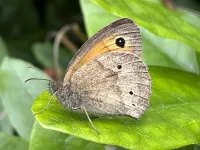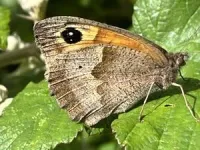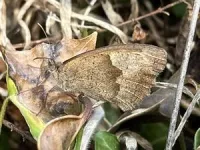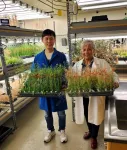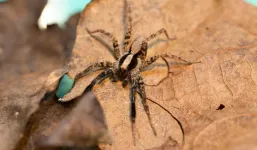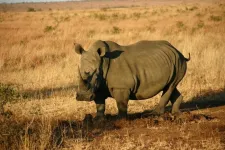(Press-News.org) Female Meadow Brown butterflies have fewer spots if they develop in warmer weather – so climate change could make them less spotty, new research shows.
University of Exeter scientists found females that developed at 11°C had six spots on average, while those developing 15°C had just three.
The findings challenge long-held scientific views about why these butterflies have varying numbers of spots.
“Meadow Browns always have large ‘eyespots’ on their forewings, probably for startling predators,” said Professor Richard ffrench-Constant, from the Centre for Ecology and Conservation on Exeter’s Penryn Campus in Cornwall.
“They also have smaller spots on their hindwings, probably useful for camouflage when the butterfly is at rest.
“Our findings show that fewer of these hindwing spots appear when females experience higher temperatures during their pupal stage (in a chrysalis before emerging as a butterfly).
“This suggests the butterflies adapt their camouflage based on the conditions. For example, with fewer spots they may be harder to spot on dry, brown grass that would be more common in hot weather.
“We did not observe such a strong effect in males, possibly because their spots are important for sexual selection (attracting females).”
Since the classic work of biologist EB Ford, eyespot variation in the Meadow Brown butterfly has been used as an example of “genetic polymorphism” (the co-existence of multiple genetic forms in a single population).
However, the new study shows the eyespot variation is caused by thermal plasticity (the ability to react to changing temperatures).
“This is a family story for me, as my father collected butterflies for EB Ford here in Cornwall,” Professor ffrench-Constant said.
“In the new study, we looked at current Cornish populations – collecting males and females from the same field every day throughout the flight season – and historical collections from Eton and Buckingham.”
The researchers predict that spotting will decrease year on year as our climate warms.
Professor ffrench-Constant added: “This is an unexpected consequence of climate change. We tend to think about species moving north, rather than changing appearance.”
Meadow Browns spend about 28 days in the pupal stage, usually emerging in late spring in the UK.
The paper, published in the journal Ecology and Evolution, is entitled: “Eyespot variation and field temperature in the Meadow Brown butterfly.”
END
Butterflies could lose spots as climate warms
2024-01-18
ELSE PRESS RELEASES FROM THIS DATE:
Infusion of bone marrow mononuclear cells results in decreased intensive care needs and white matter preservation for children with severe traumatic brain injury
2024-01-18
After children experienced severe traumatic brain injury, the infusion of bone marrow mononuclear cells derived from the patient’s own bones led to less time spent in intensive care, less intense therapy, and, significantly, the structural preservation of white matter, which constitutes about half the total volume of the brain, according to new research from UTHealth Houston.
The study, published recently in the medical journal Brain, was based on the results of a Phase II clinical trial led by first author Charles S. Cox Jr., MD, the George and Cynthia Mitchell Distinguished Chair in Neurosciences and the Glassell Family Distinguished Chair in the ...
National award goes to Sandia Labs engineer
2024-01-18
ALBUQUERQUE, N.M. — Tony Garcia often reflects on his grandfather’s words: “Work hard and be good to people, and you’ll end up happy.”
This simple principle has been Garcia’s beacon throughout his academic and professional journeys, and now has led to his recognition with a prestigious 2023 Society of Hispanic Professional Engineers STAR of Today award for technical achievement.
The STAR awards recognize individuals in STEM who are not only excelling in their fields but also making a significant impact through their work, research ...
Researchers make links between woolly mammoths and colonization of the Americas
2024-01-17
Imagine journeying back in time to the era of woolly mammoths, some 14,000 years ago. That’s what a team of international researchers from the University of Ottawa, the University of Alaska Fairbanks, McMaster University and Adelphi University, and Indigenous scholars, managed to do. Using novel high-resolution isotope profiling (a sort of “paleo-GPS”), they were able to connect the dots between the wanderings of a woolly mammoth and the earliest known human settlements in the remote ...
Governor Hochul announces CUNY to receive $75 million from the Simons Foundation, largest donation in university history
2024-01-17
Governor Kathy Hochul today announced that the City University of New York is receiving $75 million from the Simons Foundation, the University’s largest-ever donation. The gift earmarks $50 million to establish CUNY as a hub for computational science and $25 million to support CUNY’s participation in the Governor’s proposed Empire AI project. Computational science uses programming techniques to solve problems in fields such as biology, astrophysics and neuroscience.
“For many New Yorkers, higher education is critical to pursuing a career ...
Keys to aging hidden in the leaves
2024-01-17
Scientists have known about a particular organelle in plant cells for over a century. However, UC Riverside scientists have only now discovered that organelle’s key role in aging.
The researchers initially set out to understand more generally which parts of plant cells control plant responses to stress from things like infections, too much salt, or too little light. Serendipitously, they found this organelle, and a protein responsible for maintaining the organelle, control whether plants survive being left too often in the dark.
Because they had not expected this discovery, which is ...
Rain can spoil a wolf spider’s day, too
2024-01-17
If you hate the rain, you have something in common with wolf spiders.
Researchers at the University of Cincinnati found that wolf spiders can’t signal others or perceive danger from predators as easily on rain-soaked leaves compared to dry ones. Even communicating with would-be mates is harder after it rains.
The study was published in the Journal of Insect Behavior.
Biologists in UC’s College of Arts and Sciences studied Schizocosa ocreata, a wolf spider found across much of the United States. Males respond to chemical signals from females by using a combination of visual ...
Independent dispute resolution of no surprises act financially unviable for radiology
2024-01-17
Leesburg, VA, January 17, 2024—According to the American Journal of Roentgenology (AJR), the No Surprises Act’s (NSA) independent dispute resolution (IDR) process would be financially unfeasible for a large portion of out-of-network (OON) claims for hospital-based specialties—more so for radiologists than other specialists.
“Although the NSA enacted important patient protections, IDR fees limit clinicians’ opportunities to dispute payer-determined payments and potentially undermine their bargaining power in contract negotiations,” ...
AMS presidential forum to address “Climate Science as Service to Society”
2024-01-17
[Boston, MA—January 17, 2024] The American Meteorological Society (AMS) will open its 104th Annual Meeting with a Presidential Forum on how to advance society’s acceptance and use of climate science. Distinguished atmospheric scientist Dr. Kerry Emanuel will moderate a “fireside chat” with Monica Medina, President and CEO of the Wildlife Conservation Society and former Deputy Assistant Secretary at the State Department, and Bob Inglis, Executive Director of RepublicEn.org and former congressman from South Carolina. The Forum, with opening remarks by AMS President ...
Researchers find anti-HIV drugs may prevent complications from bacterial sepsis
2024-01-17
Bacterial infections can lead to the formation of abscesses — pockets of dead cells and debris surrounded by inflammatory immune cells. Bacteria multiply within abscesses, causing more inflammation and further damage to surrounding tissues. In severe cases, these immune reactions spread across the body, resulting in life-threatening organ failure, or sepsis. But how these abscesses form and what can be done to prevent them were previously not well understood.
Using preclinical models, investigators from Brigham and ...
The heat is on: UMass Amherst scientists discover southern Africa’s temps will rise past the rhinos’ tolerance
2024-01-17
January 17, 2024
The Heat is on: UMass Amherst Scientists Discover Southern Africa’s Temps Will Rise Past the Rhinos’ Tolerance
New research shows that rising temperatures caused by climate change are impacting the remaining black and white rhinoceros populations on the African continent, suggests taking steps to mitigate impact now
AMHERST, Mass. – Southern Africa contains the vast majority of the world’s remaining populations of both black and white rhinoceroses ...
